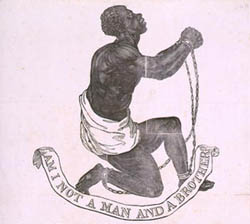Friday Random Ten: subversive lazy linking edition
Like the Holy Roman Empire, this Friday Random Ten
is neither Friday, nor Random, nor Ten. But it is (I think) a good idea;
thanks to Random Thoughts and to Trish Wilson for it. Here’s the idea: you’ve probably all heard of the Friday Random Ten music game. This is sort of like that, except that it’s ten links. The links go to ten worthy posts by webloggers outside of the usual club of folks you link to. Why? Because weblogging, and political weblogging in particular, is interesting and fun and increasingly important but it’s also got a tendency to be inbred and clubby. Most of us are not atop the A-list “dominant link hierarchy,” but we participate in it, and if we don’t try to break up the cartel a bit, who will? The Danny Bonaduce of the blogosphere? I think not. So here’s mine:
When it comes to the hand-wringing and the bloviating over the Left’s attitude towards feminism, abortion, and sexuality, media girl 2005-02-24: Not negotiable puts it better than I could in just three sentences:
What a lot people — mostly men — don’t seem to understand is that women’s control over our own bodies is not negotiable. We are not slaves. We are not breeding machines to be regulated and controlled by the government.
Bitch, Ph.D. 2005-02-22: The Washington Monthly points out that it’s that time of the three months again: Kevin Drum has come down with a nasty case of QMS, and it’s made him impulsive and irrational enough to start spouting off without so much as bothering to so much as search Google for
female political bloggers
first. Or, as we have it from the good doctor:Oh look. We have another well-meaning non-sexist liberal non-discriminatory fuckwit around being all concerned about how women just don’t choose to talk about politics. Or maybe it’s that they’re innately less comfortable with the “food fight” nature of political discourse.
Hey Drum, you moron, try doing some goddamn research before you shoot your mouth off, ok?
How the fuck do men ever manage to succeed in any kind of intellectual endeavor without bothering to find out what the fuck they’re talking about before shooting their mouths off? Oh yeah, right, it’s the magic power of the cock. Jesus.
Bean has a new blog (you may know her from her posts on Alas, A Blog), and in Cool Beans 2005-03-03: The Invisibility of Feminism she points to another one for the
what is seen and what is not seen
file. Here we have one of the countless examples of why men in the media seem able to confidently declare feminism dead once every five years or so, without the least bit of circumspection: because nobody seems to feel obligated to actually, y’know, look up feminist publications before they gather their data and start spouting off.Jill Walker at misbehaving.net 2005-02-27: The Debian Women Project notes the lack of women in open source development, or at least in Debian development specifically.
Hanna Wallach posted her slides from a talk she gave on Debian Women yesterday. She showed statistics showing that 10-20% of computer science undergrads are women, and that 20-35% of IT professionals are women, and yet there are only 4-8 women among the nearly 1000 developers of the open source Debian "universal" operating system. That’s less than one percent. While Hanna mentions possible reasons briefly, her main concern in the talk is to show what is being done in Debian Women.
It’s good to see that the topic is being addressed, and everyone’s best wishes should be with Debian Women, which seems to be off to a good running start; one can only pray that the boys will keep tabs on the organizing and action that’s going on, instead of treating everyone to a trimonthly outbreak of oblivious
Where are all the female software developers?
e-mails on devel mailing lists…Mouse Words 2005-03-05: 10 things you need to know about men demonstrates once again that shooting fish in a barrel can be damn funny if you have the talent (as Amanda clearly does).
From iVillage and by Richie Sambora. Sambora couldn’t tell you shit about playing guitar, and he’s a guitarist. So why do we assume he knows something about being a man? As usual, we women are presumed pretty clueless when it comes to men. Men, however, know everything they need to know about us.
…
We want you to be our mothers.
Heather Locklear is a saint. And now I have the unfortunate image of her man calling her Mommy and I’m all upset.
We don’t mind it when you dress us.
If he asks for a sponge bath next, I hope Locklear takes a moment to remember that she is a stunning beauty who has exactly zero reason to fear that she’s headed for spinsterhood if she suddenly gave up playing Airplane in order to get her husband to eat.
Avedon Carol 205-03-05: How you become crazy takes on the pervasive idiot notion that any ideological skew in the media, if it exists, is prima facie evidence that the media is doing something wrong and therefore needs to change:
I have never understood why this should be a criticism of the media, anymore than it makes sense that this is a negative trait of academe; if the people who are best educated and most aware of what is going on are more liberal, maybe that’s because you have to be ignorant to swallow conservatism. What is really suggested by this “criticism” is that the alleged “bias” isn’t bias at all, it’s just a recognition of what is, and that bias is required to lean to the right of this “liberal” position. Indeed, the behavior we’re seeing from the administration is fairly explicit in that we are told that simple facts are “biased”. The news media are not supposed to tell the public the truth about anything because that would bias us against the administration. The real question is not, then, about a bias toward liberalism or conservatism, but rather a belief that “news” should make some attempt to serve the public rather than just the corporate hierarchy.
…
Those people really do need reminders. They need to be told every single time they spew right-wing bull. They need to be reminded over and over that reality still holds sway for at least half of the population. Most of all, they need to be told that we’re not talking about forgetfulness and errors and “misstatements” from Condi and George and friends, we’re talking about lying, and they should call a spade a spade.
Whether Avedon’s right or not about all that (I think she’s clearly right about the media’s limitless charity for Bush administration fraudsters, probably right about some parts of reporters’ policy skew, and probably mistaken about others), the underlying point is awfully damned important: the demographic arguments that “liberal media” bloviators (and their “corporate media” comrades on the Left) aren’t enough to show anything in particular. The perverse sort of ideological identity politics that the Right especially loves these days needs to be called for what it is: pure bluff.
Read the whole thing. (Thanks, Trish.)
[Update 2005-03-27: Incidentally, the name is Avedon Carol, not Carol Avedon as I originally wrote. Oy. My bad!]
What Is Past Is Prologue 2005-03-04: How Low Can You Go follows up with this fine look at how the Great Americans at MSNBC ensure that the tough questions get asked in spite of the fiendish plot of the liberal media hegemons:
Then he went on to flagellate that old tired concept that everyone knows is a lie: The Vicious Liberal Media. His commentator? The resentful Ari Fleischer, clearly still smarting from his days as White House Press Secretary
Clancy at CultureCat 2005-03-04: Orphan Works: Tell the Copyright Office Your Stories calls for shedding light on one of the rarely-seen but often-onerous unintended consequences of the intellectual enclosure regime: valuable works are left in limbo when you can’t find their copyright holders. I’m sure that making works completely impossible to reproduce for a good 70 years or so is really incentivizing some creative excellence. Somehow.
Micha Ghertner at Catallarchy 2005-03-06: Small Is Beautiful points out something that you just don’t see in most discussions of prying education out of the hands of the bureaucratic State: the way that government monopolization of schools and politicized pressures constrict schools into multimillion dollar all-things-to-all-people facilities–thus forcing down the number of groups that could reasonably get a school off the ground–thus forcing them into crowded splinding-and-sorting centers for thousands of students:
Would people want to send their kids to small, simple, less expensive schools? Would some parents drop off their kids at an individualized schooling program for a few hours, and then take them to the gym or the community center for a sports league or a friendly pick-up game with other children? Those who are satisfied with the current system of institutionalized babysitting may want to stick with the status quo. Those who would prefer a close-knit atmosphere, where everyone knows each other by name, and where the programs and costs are specially tailored to each individual student’s needs, may conclude that bigger is not always better.
Alina at Totalitarianism Today 2005-03-01: International aid worthy of the title? reminds us of the dirty little secret about government-to-government
foreign aid
: when you give money to the government instead of to the people in distress, they just waste it.Voltairine de Cleyre (1907-04-28): They Who Marry Do Ill argues (under the title of a particularly delightful turn of phrase) that marriage — whether government-sponsored or wildcatted, whether religious or secular — offends against individualist principles:
Some fifteen or eighteen years ago, when I had not been out of the convent long enough to forget its teachings, nor lived and experienced enough to work out my own definitions, I considered that marriage was
a sacrament of the Church
or it wascivil ceremony performed by the State,
by which a man and a woman were united for life, or until the divorce court separated them. With all the energy of a neophyte freethinker, I attacked religious marriage as an unwarranted interference on the part of the priest with the affairs of individuals, condemned theuntil death do us part
promise as one of the immoralities which made a person a slave through all his future to his present feelings, and urged the miserable vulgarity of both the religious and civil ceremony, by which the intimate personal relations of two individuals are made topic of comment and jest by the public.By all this I still hold. Nothing is more disgustingly vulgar to me than the so-called sacrament of marriage; outraging of all delicacy in the trumpeting of private matters in the general ear. Need I recall, for example, the unprinted and unprintable floating literature concerning the marriage of Alice Roosevelt, when the so-called
American princess
was targeted by every lewd jester in the country, because, forsooth, the whole world had to be informed of her forthcoming union with Mr. Longworth! But it is neither the religious nor the civil ceremony that I refer to now, when I say thatthose who marry do ill.
The ceremony is only a form, a ghost, a meatless shell. By marriage I mean the real thing, the permanent relation of a man and a woman, sexual and economical, whereby the present home and family life is maintained. It is of no importance to me whether this is a polygamous, polyandric or monogamous marriage, nor whether it is blessed by a priest, permitted by a magistrate, contracted publicly or privately, or not contracted at all. It is the permanent dependent relationship which, I affirm, is detrimental to the growth of individual character, and to which I am unequivocally opposed. Now my opponents know where to find me.
O.K.; that was eleven, not ten. And the eleventh isn’t exactly a blog link anyway. But I did warn you ahead of time that Friday Random Ten
would be a name here, not a definite description. And if the dominant link hierarchy
in the weblog world is worth breaking up, then I’d have to say that it’s also worth breaking up weblog reading with a bit of material that was written before the turn of the 21st century. Enjoy the subversion!


